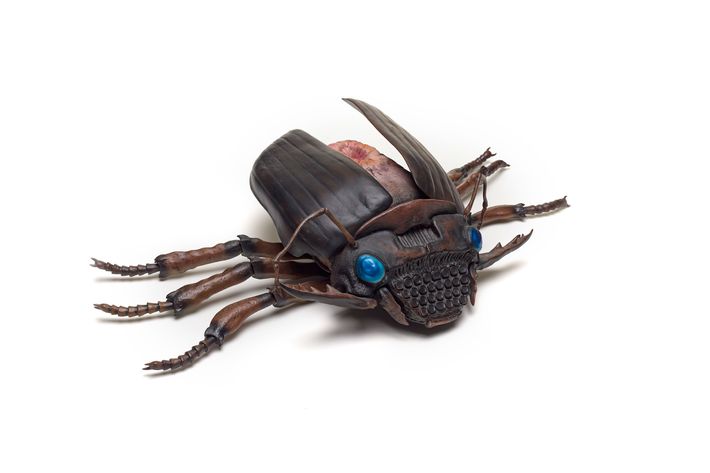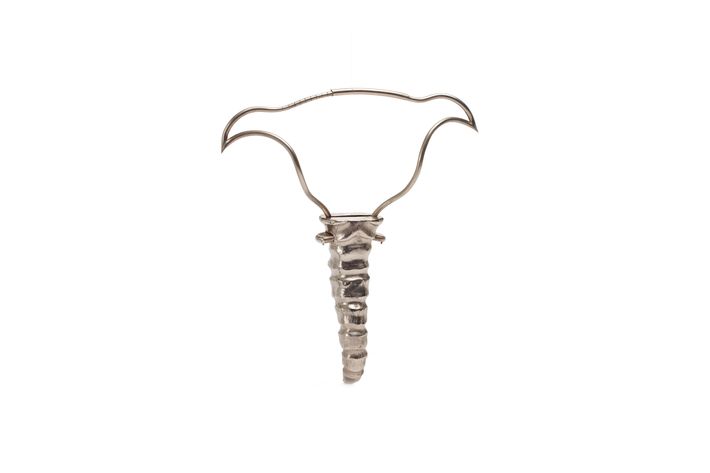
ÔÇ£Well, IÔÇÖm extraordinarily lazy, which, in professional terms, you say ÔÇÿcollaborative,ÔÇÖÔÇØ said David Cronenberg, explaining to a press conference at the Toronto International Film Festival why heÔÇÖs happily donating all of his files and memorabilia to the festivalÔÇÖs permanent home, the TIFF Bell Lightbox. Cronenberg, a Toronto resident, has actually been doing so for twenty years, since TIFF director Piers Handling told him, ÔÇ£ÔÇÿDavid, let us be your garbage can,ÔÇÖÔÇØ said Cronenberg. ÔÇ£Imagine someone saying that to you. It was fantastic!ÔÇØ Cronenberg turned 70 this March, which seems to be as fitting an occasion as any to start displaying that vast array of ÔÇ£garbage.ÔÇØ So on November 1, TIFF will debut the Cronenberg Project, a huge, multiplatform celebration of his work, which will include a full film retrospective, including his short films; a visual art exhibition featuring work inspired by Cronenberg (already on display at TorontoÔÇÖs MOCCA); and an interactive section meant to re-create the experience of being inside one of his films.
Among the memorabilia to be featured is the pod from The Fly, the gynecological tools from Dead Ringers (ÔÇ£I always thought someone could make a wonderful set of jewelry based on those,ÔÇØ Cronenberg said), and the beetle typewriters from Naked Lunch, along with a re-creation of the bar from that movie, complete with a Mugwump. Cronenberg even plans to make a short film just for the exhibition, but has been a little sidetracked filming and editing his latest movie, the Hollywood satire Maps to the Stars with Julianne Moore, John Cusack, Robert Pattinson, and Mia Wasikowska.

Cronenberg was loose and jovial in the press conference ÔÇö and why wouldnÔÇÖt he be ÔÇö throwing out all sorts of fun facts and one-liners. We learned that his first film, Shivers, was supposed to be called Orgy of Blood Parasites. (ÔÇ£I later got a couple of those,ÔÇØ Cronenberg quipped.) When a reporter asked him why his films are so often about mind-body transformation, the director replied that he thought all of his films are about mind-body transformation: ÔÇ£You donÔÇÖt have a body with a mind or a mind without a body. Well, some actors you might just get a body.ÔÇØ And he was equally fun and game when I talked to him later that day about all of this career celebration, an old and very odd Nike commercial he did, and more.

You were quite quippy in that press conference.
Eh, well, it can be enjoyable if you just relax and have some fun with it.
 
Of the objects in the exhibition, were there any you were having trouble parting with?
No, because, honestly, Im not a fetishist. Their life, their proper life, is in the movies and its not as though I really had them. Some of them, yes, some of these things are things that I  for example, theres a leg brace that James Spader wore in Crash and I have that in my house as a sculpture. Its a beautiful metal thing, you know, a structure. So I expect to get it back. Heh, heh. I havent parted with, its just, its on loan, you know. [Laughs.] Im sharing it. And theres a painting that Burroughs did for me, and of course those particular objects, I wouldnt want to part with them. But I havent.
 
What do you think of when you wake up in the morning and see the leg brace from Crash in your living room?
You stop seeing it. I mean, just like you would anything in your house. It becomes so familiar to you itÔÇÖs a comforting thing. You know, whatever paintings you have, or whatever posters, I think you have the same experience. I donÔÇÖt look at it and say, ÔÇ£Crash! Spader! Yeah! Yeah!ÔÇØ No, I donÔÇÖt think of it at all. ItÔÇÖs just part of the landscape. It could be a tree, you know.
Do any of the props bring back memories, like the gynecological surgical tools from Dead Ringers?
Well, all the shots from the movies bring back memories. ItÔÇÖs not the objects, per se. For example, people say, ÔÇ£Do you look at your old movies?ÔÇØ I say, ÔÇ£Well, really, I canÔÇÖt see them as movies.ÔÇØ Because every movie in a sense is a documentary for me of what I was doing that day. So I remember everything. I remember, you know, what was going on on the set and the relationship with the actors, the crew. So I canÔÇÖt really look at my movies objectively like movies. ThatÔÇÖs one of the reasons I donÔÇÖt want to look at them, because I canÔÇÖt watch them as a movie and say, ÔÇ£Wow, that was really good,ÔÇØ or ÔÇ£It wasnÔÇÖt bad.ÔÇØ So itÔÇÖs not a question of looking at them and thinking of mistakes I made or something like that, IÔÇÖm not thinking of that. I just canÔÇÖt see them as movies. If I ever felt like I wanted to survey my past life, I could look at my movies and it would remind me of not just what was happening in the movie, but what was happening in my life while I was making the movie. I could be reminded of everything. ThatÔÇÖs how it feels to me.
 
Were there any movies you didnÔÇÖt want to have in the retrospective?
No, I dont have any trouble letting go of that, you know. For example, there are some movies, some things that Ive done that I dont think are great. I havent tried to suppress them because theyre not good enough. Im thinking, Look, these are 
 
 which ones?
Well, for example, my first movie, Shivers, had some very, uh, inventive things in it. But it was also pretty iffy technically at times because I was, as I will say when I introduce the film later today, when you watch it, youÔÇÖre watching me at film school. I mean, making that movie was my film school and I made a lot of mistakes and a lot of things I wasnÔÇÖt in control of and a lot of things I didnÔÇÖt understand, and thatÔÇÖs why this works and this seems awkward, because they were. So I could say, ÔÇ£Well, Shivers is not one of my best films, is not one of my best body films, so why should I show it?ÔÇØ Well, IÔÇÖm willing to share the experience, you know, and say, ÔÇ£Look, this is what happened to me and itÔÇÖs embodied in my film and IÔÇÖm not ashamed of it.ÔÇØ
 
You donÔÇÖt cringe at any particular part of that movie.
Oh, yes! Absolutely! But as I say, I can avoid that by not watching it. [Laughs.]
 
I was intrigued by the old Nike commercial you shot, which is in the MOCCA exhibit, which features a runner emerging from an alien pod. Did that actually sell sneakers?
I have no idea, because what happened was unique at the time: They invited a bunch of filmmakers to create their own commercial. In other words, because I had tried directing a couple of commercials and I found that it was really restrictive and I didnÔÇÖt enjoy it. Ridley Scott has done great commercials and a lot of people have had great careers doing very interesting commercials. My experience is not that. But here is an opportunity to write my own commercial, to just create my own Nike commercial, and thatÔÇÖs what I came up with. So it isnÔÇÖt just me directing a commercial, itÔÇÖs my creating it. That was unique. I donÔÇÖt think it happened again. I donÔÇÖt know that any manufacturer of anything would really do that anymore, you know.
 
For people who wonÔÇÖt see the exhibition, how would you describe your vision for the commercial?
Well, the theme of it for me was transformation. The whole idea of insects and transformation and things emerging from chrysalises and cocoons in a different form, that was basically my approach. ItÔÇÖs an insect Nike commercial on a strange other planet with a really sort of mysterious ambiance and a wheelbarrow full of chrysalises and stuff, and thatÔÇÖs really what it was. What I was suggesting to Nike was they change their logo from Just Do It to ÔÇ£We Transform You.ÔÇØ They didnÔÇÖt go for that. [Laughs.] But they accepted that the theme of this particular commercial was that, that Nike will transform you from a mediocre athlete to a wonderful athlete. Or something like that. [Laughs.]
 
The MOCCA exhibition is all art inspired by your work. Ever been creeped out by art inspired by you?
Creeped out, no, but you can definitely  I mean, its interesting. You can say, Wow, I wouldnt have thought that anything I did would result in this. And you can say to yourself, Well, maybe they misunderstood me. Or you can say, Maybe they understood me very well, beyond what I understand. So its intriguing. Im not very defensive about it or protective. I think Im happy to open it up and just Im flattered that they would want to collaborate in the sense of working within the parameters of my work and do their own work. Not all artists want to do that.

